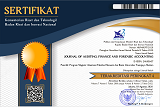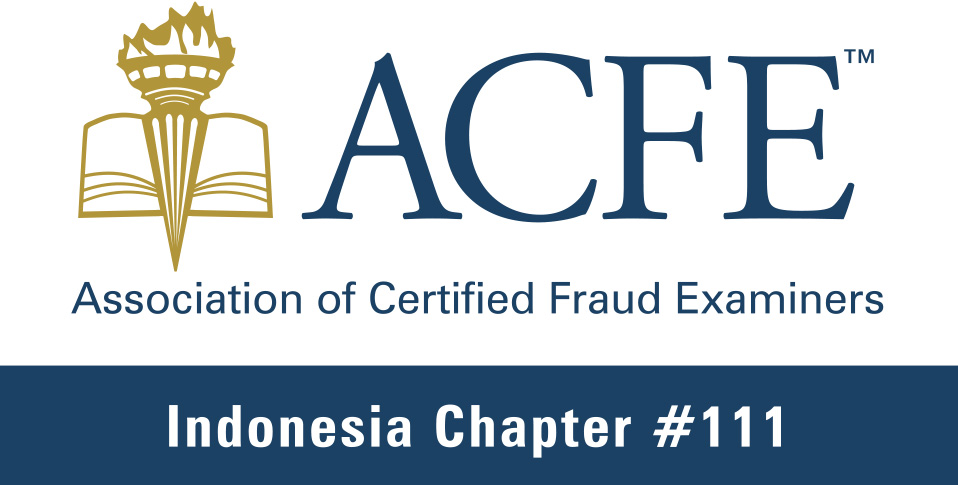IFRS Sustainability Standards Implementation Readiness: Does Board of Directors Matters?
Abstract
Keywords
Full Text:
PDFReferences
Adams, C. A., & McNicholas, P. (2007). Making a Difference: Sustainability Reporting, Accountability and Organisational Change. Accounting, Auditing and Accountability Journal, 20(3), 382–402. https://doi.org/10.1108/09513570710748553.
Alipour, M., Ghanbari, M., Jamshidinavid, B., & Taherabadi, A. (2019). Does Board Independence Moderate the Relationship Between Environmental Disclosure Quality and Performance? Evidence from Static and Dynamic Panel Data. Corporate Governance, 19(3), 580-610. https://doi.org/10.1108/CG-06-2018-0196.
Allegrini, M., & Greco, G. (2013). Corporate Boards, Audit Committees and Voluntary Disclosure: Evidence from Italian Listed Companies. Journal of Management & Governance, 17(1), 187–216. https://doi.org/10.1007/s10997-011-9168-3.
Anyigbah, E., Kong, Y., Edziah, B. K., Ahoto, A. T., & Ahiaku, W. S. (2023). Board Characteristics and Corporate Sustainability Reporting: Evidence from Chinese Listed Companies. Sustainability (Switzerland), 15(4), 1-26. https://doi.org/10.3390/su15043553.
Alzeban, A. (2018). The Association Between Internal Audit Department Characteristics and IFRS Compliance. Asian Review of Accounting, 26(3), 336–358. https://doi.org/10.1108/ARA-03-2017-0054.
Bahari, A., Chasvella, D. A., & Komalasari, S. P. (2022). Universitas di Indonesia: Apakah Sudah Siap Untuk Menyusun Laporan Keberlanjutan?. Jurnal Akuntansi Keuangan dan Bisnis, 15(2). https://doi.org/10.35143/jakb.v15i2.5342.
Bakri, M. A., Ayub, N., & Gazali, H. M. (2024). Integrating Agency and Resource Dependency Theories: The Moderating Effect of Board Size on the Relationship Between Dividends and Firm Value in Malaysia. Future Business Journal, 10, 37. https://doi.org/10.1186/s43093-024-00324-6.
Benhayoun, I., El Amrani, M., Barhdadi, A., & Azzaoui, W. (2025). Adoption of ISSB Standards in Emerging Markets-Insights from Moroccan Companies’ Organizational Readiness. Journal of Financial Reporting and Accounting. https://doi.org/10.1108/JFRA-07-2024-0468.
Bolourian, S., Angus, A., & Alinaghian, L. (2021). The Impact of Corporate Governance on Corporate Social Responsibility at the Board-Level: A Critical Assessment. Journal of Cleaner Production, 291(2). Elsevier Ltd. https://doi.org/10.1016/j.jclepro.2020.125752
Borgi, H., & Mnif, Y. (2021). Compliance Level with IFRS Disclosure Requirements across 12 African Countries: Do Enforcement Mechanisms Matter? Journal of Financial Regulation and Compliance, 30(1), 60–81. https://doi.org/10.1108/JFRC-01-2021-0002.
Brigham, E. F., & Houston, J. F. (2019). Fundamentals of Financial Management. Cengage Learning.
Buhr, N., & Freedman, M. (2001). Culture, Institutional Factors and Differences in Environmental Disclosure Between Canada and the United States. Critical Perspectives on Accounting, 12(3), 293–322. https://doi.org/10.1006/cpac.2000.0435.
Certo, S. T. (2003). Influencing Initial Public Offering Investors with Prestige: Signaling with Board Structures. The Academy of Management Review, 28(3), 432-446. https://doi.org/10.2307/30040731.
Christensen, H. B., Hail, L., & Leuz, C. (2021). Mandatory CSR and Sustainability Reporting: Economic Analysis and Literature Review. Review of Accounting Studies, 26(3), 1176–1248. https://doi.org/10.1007/s11142-021-09609-5.
Deegan, C., Rankin, M., & Voght, P. (2000). Firms’ Disclosure Reactions to Major Social Incidents: Australian Evidence. Accounting Forum, 24(1), 101-130.
Dess, G., Mcnamara, G., Eisner, A., & Sauerwald, S. (2015). Strategic Management Text & Cases. MC. Graw Hill.
Donnelly, R., & Mulcahy, M. (2008). Board Structure, Ownership, and Voluntary Disclosure in Ireland. Corporate Governance: An International Review, 16(5), 416–429. https://doi.org/10.1111/j.1467-8683.2008.00692.x.
Enciso-Alfaro, S. Y., & García-Sánchez, I. M. (2023). Corporate Governance and Environmental Sustainability: Addressing the Dual Theme from a Bibliometric Approach. Corporate Social Responsibility and Environmental Management, 30(3), 1025–1041. https://doi.org/10.1002/csr.2403.
Elvia Shauki, A. T. F. – C. I., & T. T. I. (2022). Publikasi Task Force Comprehensive Corporate Reporting IAI. In Iai, Ifac, Ca Is a Difference Maker (Issue 02).
Fakoya, M. B., & Nakeng, M. V. (2019). Board Characteristics and Sustainable Energy Performance of Selected Companies in South Africa. Sustainable Production and Consumption, 18, 190–199. https://doi.org/10.1016/j.spc.2019.02.003.
Formigoni, H., Segura, L., & Gallego-Álvarez, I. (2021). Board of Directors Characteristics and Disclosure Practices of Corporate Social Responsibility: A Comparative Study Between Brazilian and Spanish Companies. Social Responsibility Journal, 17(2), 282–298. https://doi.org/10.1108/SRJ-01-2019-0043.
Girella, L., Zambon, S., & Rossi, P. (2022). Board Characteristics and the Choice Between Sustainability and Integrated Reporting: A European Analysis. Meditari Accountancy Research, 30(3), 562–596. https://doi.org/10.1108/MEDAR-11-2020-1111.
Githaiga, P. N., & Kosgei, J. K. (2023). Board Characteristics and Sustainability Reporting: A Case of Listed Firms in East Africa. Corporate Governance, 23(1), 3–17. https://doi.org/10.1108/CG-12-2021-0449.
Habbash, M. (2016). Corporate Governance and Corporate Social Responsibility Disclosure: Evidence from Saudi Arabia. Social Responsibility Journal, 12(4), 740–754. https://doi.org/10.1108/SRJ-07-2015-0088.
Hillman, A. J., & Dalziel, T. (2003). Boards of Directors and Firm Performance: Integrating Agency and Resource Dependence Perspectives. The Academy of Management Review, 28(3), 383-396. https://doi.org/10.2307/30040728.
Hu, M., & Loh, L. (2018). Board Governance and Sustainability Disclosure: A Cross-Sectional Study of Singapore-Listed Companies. Sustainability (Switzerland), 10(7), 1-15. https://doi.org/10.3390/su10072578.
Jeanne, A., Demaria, S., & Rigot, S. (2023). What Are the Drivers of Corporates’ Climate Transparency? Evidence from the S&P 1200 Index. Ecological Economics, 213(July), 107945. https://doi.org/10.1016/j.ecolecon.2023.107945.
Jensen, M., dan W. Meckling, (1976). Theory of The Firm: Managerial Behavior, Agency and Ownership Structure. Journal of Financial Economics, 3(4), 305-360. https://doi.org/10.1016/0304-405X(76)90026-X.
Kampanje, B. P. (2023). Assessing the Readiness of the Malawian Public Companies in the Adoption of the IFRS S1 and IFRS S2 - Sustainability Disclosure Standards. INTL Sustainability Journal, 1(1), 81-101.
Katmon, N., Mohamad, Z. Z., Norwani, N. M., & Farooque, O. Al. (2019). Comprehensive Board Diversity and Quality of Corporate Social Responsibility Disclosure: Evidence from an Emerging Market. Journal of Business Ethics, 157(2), 447–481. https://doi.org/10.1007/s10551-017-3672-6.
Lai, A., & Stacchezzini, R. (2021). Organisational and Professional Challenges amid the Evolution of Sustainability Reporting: A Theoretical Framework and an Agenda for Future Research. Meditari Accountancy Research, 29(3), 405–429. https://doi.org/10.1108/MEDAR-02-2021-1199.
Liao, L., Luo, L., & Tang, Q. (2015). Gender Diversity, Board Independence, Environmental Committee and Greenhouse Gas Disclosure. British Accounting Review, 47(4), 409–424. https://doi.org/10.1016/j.bar.2014.01.002.
Indyk, M. (2022). Are the Companies Prepared for Sustainability Reporting under the ED IFRS S1 and S2? Evidence from Poland. Audit Financiar, 20(168), 641-654. https://doi.org/10.20869/AUDITF/2022/168/022.
Maroun, W., Coldwell, D., & Segal, M. (2014). SOX and the Transition from Apartheid to Democracy: South African Auditing Developments through the Lens of Modernity Theory. International Journal of Auditing, 18(3), 206–212. https://doi.org/10.1111/ijau.12025.
Moses, O., Bui, B., Houqe, M.N., & Borghei, Z. (2025). Readiness for Mandatory Climate-Related Disclosures: A Tri-Jurisdictional Analysis of Governance Attributes in Australia, New Zealand and the United Kingdom. Business Strategy and the Environment, 34, 3739–3763. https://doi.org/10.1002/bse.4154.
Nguyen, L. T., & Thanh, C. Le. (2022). The Influence of Board Characteristics on Environmental Performance: Evidence from East Asian Manufacturing Industries. International Journal of Emerging Markets, 17(10), 2702–2720. https://doi.org/10.1108/IJOEM-07-2020-0744.
Nicholson, G. J., & Kiel, G. C. (2007). Can Directors Impact Performance? A Case-Based Test of Three Theories of Corporate Governance. Corporate Governance: An International Review, 15(4), 585–608. https://doi.org/10.1111/j.1467-8683.2007.00590.x.
Villalba-Ríos, P., Barroso-Castro, C., Vecino-Gravel, J. D., & Villegas-Periñan, M. d. M. (2022). Boards of Directors and Environmental Sustainability: Finding the Synergies that Yield Results. Business Strategy and the Environment, 32(6), 3861-3886. https://doi.org/10.1002/bse.3342.
Pfeffer, J. (1972). Size and Composition of Corporate Boards of Directors: The Organization and Its Environment. Administrative Science Quarterly, 17(2), 218-228.
http://dx.doi.org/10.2307/2393956.
Pfeffer, J., & Salancik, G. R. (1978) The External Control of Organizations: A Resource Dependence Perspective. University of Illinois at Urbana-Champaign’s Academy for Entrepreneurial Leadership Historical Research Reference in Entrepreneurship, Available at SSRN: https://ssrn.com/abstract=1496213.
Publikasi Task Force CCR IAI No.7. (2023). IAI Comprehensive Corporate Reporting Task Force Publication – Issue No. 07/IV/2023.
Rossi, M., Chouaibi, J., Chouaibi, S., Jilani, W., & Chouaibi, Y. (2021). Does a Board Characteristic Moderate the Relationship between CSR Practices and Financial Performance? Evidence from European ESG Firms. Journal of Risk and Financial Management, 14, 1-15. https://doi.org/10.3390/ jrfm14080354.
Sandhu, A., & Singh, B. (2019). Board Composition and Corporate Reporting on Internet: Indian Evidence. Journal of Financial Reporting and Accounting, 17(2), 292–319. https://doi.org/10.1108/JFRA-05-2017-0031.
Sekaran, U., & Bougie, R. (2016). Research Methods for Business: A Skill Building Approach (7th ed.). John Wiley & Sons.
Sudana, I. M., & Dwiputri, E. (2018). Karakteristik CEO dan Kinerja Perusahaan Non-Keuangan yang Terdaftar di Bursa Efek Indonesia. Jurnal Manajemen Bisnis Indonesia, 5(3), 299–314. https://doi.org/10.31843/jmbi.v5i3.169.
Taglialatela, J., Pirazzi Maffiola, K., Barontini, R., & Testa, F. (2023). Board of Directors’ characteristics and environmental SDGs adoption: an international study. Corporate Social Responsibility and Environmental Management, 30(5), 2490–2506. https://doi.org/10.1002/csr.2499.
Tajuddin, A. H., Akter, S., Mohd-Rashid, R., & Mehmood, W. (2024). The Influence of Board Size and Board Independence on Triple Bottom Line Reporting. Arab Gulf Journal of Scientific Research, 42(3), 1026-1043. https://doi.org/10.1108/AGJSR-02-2023-0061.
Traxler, A. A., Schrack, D., Greiling, D., Feldbauer, J., & Lautner, M. (2023). The Interplay of Sustainability Reporting and Management Control – An Exploration of Ways for Dovetailing to Develop Reporting Beyond Accountability. Journal of Applied Accounting Research, 26(6), 160-182. https://doi.org/10.1108/JAAR-08-2022-0222.
Valeria, N. (2019). Corporate Governance and Board of Directors: The Effect of a Board Composition on Firm Sustainability Performance. Journal of Cleaner Production, 237(2019), 117727. https://doi.org/10.1016/j.jclepro.2019.117727.
Villalba-Ríos, P., Barroso-Castro, C., & Vecino-Gravel, J. D. (2022). The Influence of CEO Profile on Corporate Social Responsibility Companies. A Qualitative Comparative Analysis. Corporate Social Responsibility and Environmental Management, 29(2), 356-366. https://doi.org/10.1002/csr.2205.
Vitolla, F., Raimo, N., & Rubino, M. (2020). Board Characteristics and Integrated Reporting Quality: An Agency Theory Perspective. Corporate Social Responsibility and Environmental Management, 27(2), 1152–1163. https://doi.org/10.1002/csr.1879.
Wijayanti, R., & Setiawan, D. (2023). The Role of the Board of Directors and the Sharia Supervisory Board on Sustainability Reports. Journal of Open Innovation: Technology, Market, and Complexity, 9(3), 100083. https://doi.org/10.1016/j.joitmc.2023.100083.
DOI: https://doi.org/10.21107/jaffa.v13i1.29839
Refbacks
- There are currently no refbacks.
Our Journal indexed by:
Our support tools using:



This work is licensed under a Creative Commons Attribution 4.0 International License.












